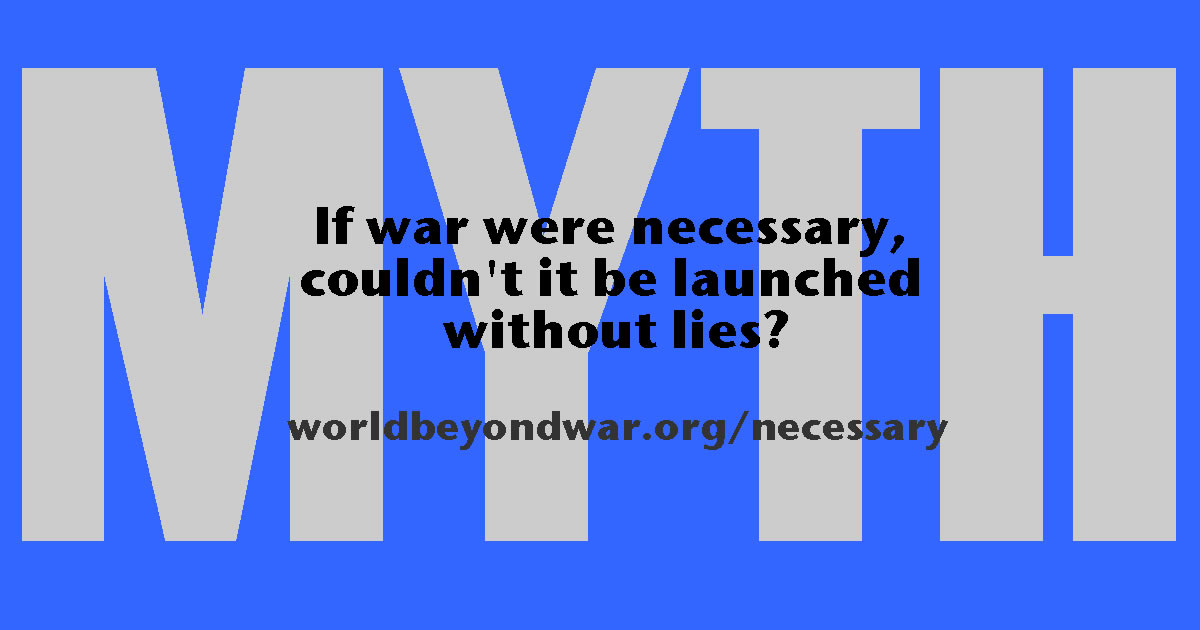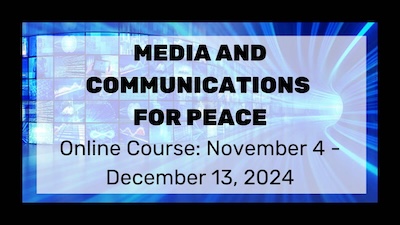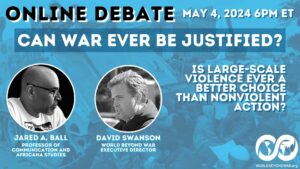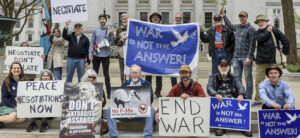Fact: Defense of freedom, democracy, and life itself, is better accomplished with nonviolent power. Only undemocratic domination over others can be served by violence and war.
It has become uncommon for war makers to advertise their wars as desirable, and standard policy to claim that every war is entered into as a last resort. This is progress to be very pleased with and to build on. It is possible to show that the launching of any particular war was not, in fact, the last resort, that superior alternatives existed. So, if war is defensible only as a last resort, war is indefensible.
For any war that occurs, and even many that do not, there can be found people who believe at the time, and after, that each particular war is or was necessary. Some people are unconvinced by claims of necessity for many wars, but insist that one or two wars in the distant past were indeed necessary. And many maintain that some war in the future could conceivably be necessary — at least for one side of the war, thus requiring the permanent maintenance of a military ready to fight.
War Is Not “Defense”
The U.S. War Department was renamed the Defense Department in 1947, and it is common in many countries to speak of the war departments of one’s own and all other nations as “defense.” But if the term has any meaning, it cannot be stretched to cover offensive war making or aggressive militarism. If “defense” is to mean something other than “offense,” then attacking another nation “so that they can’t attack us first” or “to send a message” or to “punish” a crime is not defensive and not necessary.
In 2001, the Taliban government in Afghanistan was willing to turn Osama bin Laden over to a third nation to be tried for crimes the United States was alleging he’d committed. Instead of pursuing legal prosecutions for crimes, the United States and NATO chose an illegal war that did far more damage than the crimes, continued after bin Laden was said to have left the nation, continued after bin Laden’s death was announced, and did serious lasting damage to Afghanistan, to Pakistan, to the United States and NATO nations, and to the rule of law.
According to a transcript of a meeting in February 2003 between U.S. President George W. Bush and the Prime Minister of Spain, Bush said that President Saddam Hussein had offered to leave Iraq, and to go into exile, if he could keep $1 billion. A dictator being allowed to flee with $1 billion is not an ideal outcome. But the offer was not revealed to the U.S. public. Instead, Bush’s government claimed a war was needed to defend the United States against weapons that did not exist. Rather than losing a billion dollars, the people of Iraq saw the loss of hundreds of thousands of lives, millions made refugees, their nation’s infrastructure and education and health systems destroyed, civil liberties lost, vast environmental destruction, and epidemics of disease and birth defects — all of which cost the United States $800 billion, not counting trillions of dollars in increased fuel costs, future interest payments, veterans’ care, and lost opportunities — not to mention the dead and injured, increased governmental secrecy, eroded civil liberties, damage to the earth and its atmosphere, and the moral damage of public acceptance of kidnapping, torture, and murder.
Read also: Myth: China Is a Military Threat
War Preparation Is Also Not “Defense”
The same logic that would claim that attacking another nation is “defensive” can be used to try to justify the permanent stationing of troops in another nation. The result, in both cases, is counterproductive, producing threats rather than eliminating them. Of some 196 nations on earth, the United States has troops in at least 177. A handful of other nations also have a much smaller number of troops stationed abroad. This is not a defensive or necessary activity or expense.
A defensive military would consist of a coast guard, a border patrol, anti-aircraft weapons, and other forces able to defend against an attack. The vast majority of military spending, especially by wealthy nations, is offensive. Weapons abroad, on the seas, and in outerspace are not defensive. Bombs and missiles targeting other nations are not defensive. Most wealthy nations, including those with numerous weapons that serve no defensive purpose, spend well under $100 billion each year on their militaries. The extra $900 billion that brings U.S. military spending up to roughly $1 trillion annually includes nothing defensive.
Defense Need Not Involve Violence
In defining recent wars in Afghanistan and Iraq as non-defensive, have we left out the viewpoint of Afghans and Iraqis? Is it defensive to fight back when attacked? Indeed, it is. That is the definition of defensive. But, let’s remember that it is promoters of war who have claimed that defensiveness makes a war justified. Evidence shows that the most effective means of defense is, far more often than not, nonviolent resistance. The mythology of warrior cultures suggests that nonviolent action is weak, passive, and ineffective at solving large-scale social problems. The facts show just the opposite. So it is possible that the wisest decision for Iraq or Afghanistan would have been nonviolent resistance, non-cooperation, and appeal to international justice.
Such a decision is all the more persuasive if we imagine a nation like the United States, with great control over international bodies like the United Nations, responding to an invasion from abroad. The people of the United States could refuse to recognize the foreign authority. Peace teams from abroad could join the nonviolent resistance. Targeted sanctions and prosecutions could be combined with international diplomatic pressure. There are alternatives to mass violence.
Here is a list of successful uses of unarmed nonviolent action in place of war.
War Makes Everyone Less Safe
The important question, however, is not how the nation attacked should respond, but how to prevent the aggressive nation from attacking. One way to help do that would be to spread awareness that war making endangers people rather than protecting them.
Denying that war is necessary is not the same as failing to recognize that there is evil in the world. In fact, war needs to be ranked as one of the most evil things in the world. There is nothing more evil that war can be used to prevent. And using war to prevent or punish the making of war has proven a dreadful failure.
War mythology would have us believe that war kills evil people who need to be killed to protect us and our freedoms. In reality, recent wars involving wealthy nations have been one-sided slaughters of children, the elderly, and ordinary residents of the poorer nations attacked. And while “freedom” has served as a justification for the wars, the wars have served as a justification for curtailing actual freedoms.
The idea that you could gain rights by empowering your government to operate in secret and to kill large numbers of people only sounds reasonable if war is our only tool. When all you have is a hammer, every problem looks like a nail. Thus wars are the answer to all foreign conflicts, and disastrous wars that drag on too long can be ended by enlarging them.
Preventable diseases, accidents, suicides, falls, drowning, and hot weather kill many more people in the United States and most other nations than does terrorism. If terrorism makes it necessary to invest $1 trillion a year in war preparations, what does hot weather make it necessary to do?
The myth of a great terrorist threat is wildly inflated by agencies like the FBI that regularly encourage, fund, and entrap people who could never have managed to become terrorist threats on their own.
A study of real motivations for wars makes clear that necessity hardly figures into the decision making process, other than as propaganda for the public.
“Population Control” by Mass-Murder Is Not a Solution
Among those who recognize how damaging war is, there exists another mythical justification for this peculiar institution: war is needed for population control. But the planet’s capacity to limit human population is beginning to show signs of functioning without war. The results will be horrible. A solution might be to invest some of the vast treasure now dumped into war into the development of sustainable lifestyles instead. The idea of using war to eliminate billions of men, women, and children almost renders the species that could think that thought unworthy of preserving (or at least unworthy of criticizing Nazis); fortunately most people cannot think anything so monstrous.
- World War II could not have happened without World War I, without the stupid manner of starting World War I and the even stupider manner of ending World War I which led numerous wise people to predict World War II on the spot, or without Wall Street’s funding of Nazi Germany for decades (as preferable to communists), or without the arms race and numerous bad decisions that do not need to be repeated in the future.
- The U.S. government was not hit with a surprise attack. President Franklin Roosevelt had quietly promised Churchill that the United States would work hard to provoke Japan into staging an attack. FDR knew the attack was coming, and initially drafted a declaration of war against both Germany and Japan on the evening of Pearl Harbor. Prior to Pearl Harbor, FDR had built up bases in the U.S. and multiple oceans, traded weapons to the Brits for bases, started the draft, created a list of every Japanese American person in the country, provided planes, trainers, and pilots to China, imposed harsh sanctions on Japan, and advised the U.S. military that a war with Japan was beginning. He told his top advisers he expected an attack on December 1st, which was six days off. Here’s an entry in Secretary of War Henry Stimson’s diary following a November 25, 1941, White House meeting: “The President said the Japanese were notorious for making an attack without warning and stated that we might be attacked, say next Monday, for example.”
- The war was not humanitarian and was not even marketed as such until after it was over. The United States led global conferences at which the decision was made not to accept Jewish refugees, and for explicitly racist reasons, and despite Hitler’s claim that he would send them anywhere on luxury cruise ships. There was no poster asking you to help Uncle Sam save the Jews. A ship of Jewish refugees from Germany was chased away from Miami by the Coast Guard. The U.S. and other nations refused to accept Jewish refugees, and the majority of the U.S. public supported that position. Peace groups that questioned Prime Minister Winston Churchill and his foreign secretary about shipping Jews out of Germany to save them were told that, while Hitler might very well agree to the plan, it would be too much trouble and require too many ships. The U.S. engaged in no diplomatic or military effort to save the victims in the Nazi concentration camps. Anne Frank was denied a U.S. visa. Although this point has nothing to do with a serious historian’s case for WWII as a Just War, it is so central to U.S. mythology that I’ll include here a key passage from Nicholson Baker:
“Anthony Eden, Britain’s foreign secretary, who’d been tasked by Churchill with handling queries about refugees, dealt coldly with one of many important delegations, saying that any diplomatic effort to obtain the release of the Jews from Hitler was ‘fantastically impossible.’ On a trip to the United States, Eden candidly told Cordell Hull, the secretary of state, that the real difficulty with asking Hitler for the Jews was that ‘Hitler might well take us up on any such offer, and there simply are not enough ships and means of transportation in the world to handle them.’ Churchill agreed. ‘Even were we to obtain permission to withdraw all the Jews,’ he wrote in reply to one pleading letter, ‘transport alone presents a problem which will be difficult of solution.’ Not enough shipping and transport? Two years earlier, the British had evacuated nearly 340,000 men from the beaches of Dunkirk in just nine days. The U.S. Air Force had many thousands of new planes. During even a brief armistice, the Allies could have airlifted and transported refugees in very large numbers out of the German sphere.”[vii]
Perhaps it does go to the question of “Right Intention” that the “good” side of the war simply did not give a damn about what would become the central example of the badness of the “bad” side of the war.
- The war was not defensive. FDR lied that he had a map of Nazi plans to carve up South America, that he had a Nazi plan to eliminate religion, that U.S. ships (covertly assisting British war planes) were innocently attacked by Nazis, that Germany was a threat to the United States.[viii] A case can be made that the U.S. needed to enter the war in Europe to defend other nations, which had entered to defend yet other nations, but a case could also be made that the U.S. escalated the targeting of civilians, extended the war, and inflicted more damage than might have occurred, had the U.S. done nothing, attempted diplomacy, or invested in nonviolence. To claim that a Nazi empire could have grown to someday include an occupation of the United States is wildly far fetched and not borne out by any earlier or later examples from other wars.
- We now know much more widely and with much more data that nonviolent resistance to occupation and injustice is more likely to succeed—and that success more likely to last—than violent resistance. With this knowledge, we can look back at the stunning successes of nonviolent actions against the Nazis that were not well organized or built on beyond their initial successes.[ix]
- The Good War was not good for the troops. Lacking intense modern training and psychological conditioning to prepare soldiers to engage in the unnatural act of murder, some 80 percent of U.S. and other troops in World War II did not fire their weapons at “the enemy.”[x] The fact that veterans of WWII were treated better after the war than other soldiers before or since, was the result of the pressure created by the Bonus Army after the previous war. That veterans were given free college, healthcare, and pensions was not due to the merits of the war or in some way a result of the war. Without the war, everyone could have been given free college for many years. If we provided free college to everyone today, it would then require much more than Hollywoodized World War II stories to get many people into military recruiting stations.
- Several times the number of people killed in German camps were killed outside of them in the war. The majority of those people were civilians. The scale of the killing, wounding, and destroying made WWII the single worst thing humanity has ever done to itself in a short space of time. We imagine the allies were somehow “opposed” to the far lesser killing in the camps. But that can’t justify the cure that was worse than the disease.
- Escalating the war to include the all-out destruction of civilians and cities, culminating in the completely indefensible nuking of cities took WWII out of the realm of defensible projects for many who had defended its initiation—and rightly so. Demanding unconditional surrender and seeking to maximize death and suffering did immense damage and left a grim and foreboding legacy.
- Killing huge numbers of people is supposedly defensible for the “good” side in a war, but not for the “bad” side. The distinction between the two is never as stark as fantasized. The United States had a long history as an apartheid state. U.S. traditions of oppressing African Americans, practicing genocide against Native Americans, and now interning Japanese Americans also gave rise to specific programs that inspired Germany’s Nazis—these included camps for Native Americans, and programs of eugenics and human experimentation that existed before, during, and after the war. One of these programs included giving syphilis to people in Guatemala at the same time the Nuremberg trials were taking place.[xi] The U.S. military hired hundreds of top Nazis at the end of the war; they fit right in.[xii] The U.S. aimed for a wider world empire, before the war, during it, and ever since. German neo-Nazis today, forbidden to wave the Nazi flag, sometimes wave the flag of the Confederate States of America instead.
- The “good” side of the “good war,” the party that did most of the killing and dying for the winning side, was the communist Soviet Union. That doesn’t make the war a triumph for communism, but it does tarnish Washington’s and Hollywood’s tales of triumph for “democracy.”[xiii]
- World War II still hasn’t ended. Ordinary people in the United States didn’t have their incomes taxed until World War II and that’s never stopped. It was supposed to be temporary.[xiv] WWII-era bases built around the world have never closed. U.S. troops have never left Germany or Japan.[xv] There are more than 100,000 U.S. and British bombs still in the ground in Germany, still killing.[xvi]
- Going back 75 years to a nuclear-free, colonial world of completely different structures, laws, and habits to justify what has been the greatest expense of the United States in each of the years since is a bizarre feat of self-deception that isn’t attempted in the justification of any lesser enterprise. Assume I’ve got numbers 1 through 11 totally wrong, and you’ve still got to explain how an event from the early 1940s justifies dumping a trillion 2017 dollars into war funding that could have been spent to feed, clothe, cure, and shelter millions of people, and to environmentally protect the earth.
[vii] War No More: Three Centuries of American Antiwar and Peace Writing, edited by Lawrence Rosendwald.
[viii] David Swanson, War Is A Lie, Second Edition (Charlottesville: Just World Books, 2016).
[ix] Book and Film: A Force More Powerful, http://aforcemorepowerful.org
[x] Dave Grossman, On Killing: The Psychological Cost of Learning to Kill in War and Society (Back Bay Books: 1996).
[xi] Donald G. McNeil Jr., The New York Times, “U.S. Apologizes for Syphilis Tests in Guatemala,” October 1, 2010, http://www.nytimes.com/2010/10/02/health/research/02infect.html
[xii] Annie Jacobsen, Operation Paperclip: The Secret Intelligence Program that Brought Nazi Scientists to America (Little, Brown and Company, 2014).
[xiii] Oliver Stone and Peter Kuznick, The Untold History of the United States (Gallery Books, 2013).
[xiv] Steven A. Bank, Kirk J. Stark, and Joseph J. Thorndike, War and Taxes (Urban Institute Press, 2008).
[xv] RootsAction.org, “Move Away from Nonstop War. Close the Ramstein Air Base,” http://act.rootsaction.org/p/dia/action3/common/public/?action_KEY=12254
[xvi] David Swanson, “The United States Just Bombed Germany,” http://davidswanson.org/node/5134
Recent Articles:










